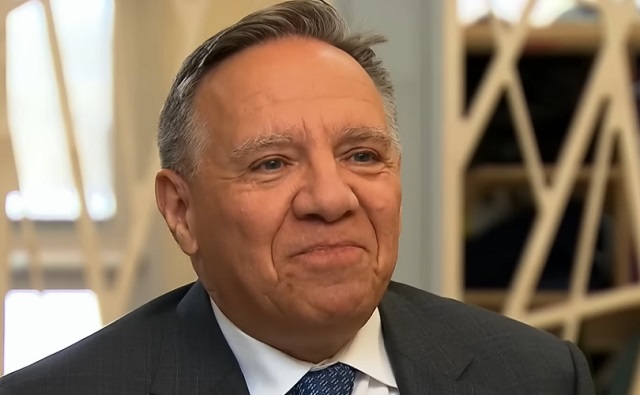Justice
Quebec’s highest court upholds law banning public servants from wearing religious symbols

Quebec Premier François Legault
From LifeSiteNews
The new ruling overrides the Quebec Superior Court’s 2021 ruling which exempted the Montreal English school board from the province’s secularism law which prohibits public servants from wearing cross or other religious symbols.
Quebec’s highest court has upheld the province’s secularism law which bans civil servants from wearing religious symbols while at work.
On February 29, the Quebec Court of Appeals ruled that that the province’s secularism law, Bill 21, is constitutional and overturned a previous decision which exempted English schools from the law.
“The Act does not offend the unwritten principles or the architecture of the Canadian Constitution, nor does it offend any pre-Confederation statute or principle having constitutional status,” Appeal Court justices, Manon Savard, Yves-Marie Morrissette et Marie-France Bich wrote in their decision.
Bill 21, passed in 2019, bans all public servants, including public school teachers, police officers, government lawyers, and wildlife officials, from wearing any religious symbols while at work.
However, citing its commitment to “diversity, acceptance, tolerance and respect for individual rights and religious freedoms,” the Montreal English School Board indicated that it would not comply with the new law.
While the Quebec Superior Court exempted English schools from the secularism law in April 2021, the new 290-page ruling overrides the lower court’s decision.
The Superior Court decision was challenged in November 2022 by various civil liberties groups in addition to the Quebec government, which argued it created an unfair distinction between English and French schools.
The new decision relies on the province’s use of the notwithstanding clause, which allows the province to override most challenges to the legislation.
The notwithstanding clause, embedded in section 33 of the Canadian Charter of Rights and Freedoms, allows provinces to temporarily override sections of the Charter of Rights and Freedoms to protect new laws from being scrapped by the courts.
“The court has confirmed Quebec’s right to make its own decisions,” Premier François Legault told reporters in Montreal Thursday. “Secularism is a collective choice that is part of our history, in continuity with the Quiet Revolution. Secularism is a principle that unites us as a nation in Quebec.”
Legault confirmed that the province will continue using notwithstanding clause for “as long as it is necessary for Canada to recognize the societal choice of the Quebec nation.”
He added that the law is “non-negotiable” as the province recently tabled legislation to renew the application of the clause to Bill 21 for another five years.
While the decision was celebrated by the Quebec premier, the Canadian Civil Liberties Association (CCLA) called the ruling a “painful setback.”
“This is a heart-wrenching day and highlights the urgent need for people across Quebec who have stood up for the values of equality, justice and freedom to continue to raise their voices,” CCLA Executive Director and General Counsel Noa Mendelsohn Aviv said in a press release.
“These values are the ones that fuel our legal challenge and that lie at the heart of our collective struggle against Bill 21,” Aviv declared.
Similarly, Quebec Life Coalition President Georges Buscemi told LifeSiteNews, “This decision is completely consistent with the recent historical trend in Quebec, which is one of rejecting its Catholic heritage in favor of a liberal ‘enlightened’ worldview, which considers religion to be a purely private matter.”
“This decision confirms the ‘legality’ of Quebec’s secularism law, which purports to make the state ‘neutral’ with respect to religions,” he continued. “Whatever the intentions of this law, its effect is to extirpate all signs of religion from the public square, from Knights of Columbus meetings in community centers to prayer in daycares. So called state-neutrality is quickly becoming state atheism in practice.”
Censorship Industrial Complex
Legal warning sent to Ontario school board for suspending elected school council member

The Justice Centre for Constitutional Freedoms announces that a legal warning letter has been sent to the Hamilton-Wentworth District School Board after it suspended a parent from her role on the School Council for respectfully objecting to land acknowledgements.
Catherine Kronas, a concerned parent with a child enrolled at Ancaster High Secondary School, was re-elected to serve on School Council in October 2024.
During a Council meeting on April 9, 2025, Ms. Kronas asked that her respectful objection to land acknowledgements be noted in the minutes. No disruption occurred; her comments were limited to requesting that her dissenting viewpoint be recorded.
On May 22, 2025, however, the School Board informed Ms. Kronas that her involvement on the Council was being “paused” based on allegations that she had caused harm and had violated a Code of Conduct Policy. She has not been permitted to attend the next scheduled meeting.
Ms. Kronas was unsettled by the Board’s decision, saying, “I was taken aback by the Board’s decision to suspend me from the School Council after delivering a respectful objection, especially given assurances made at a previous council meeting and outlined in the Council bylaws that open dialogue and diverse perspectives are welcomed.”
“By barring me from the next meeting, the Council sends a troubling message to all parents: that even respectful disagreement may be met not with dialogue, but with disciplinary action. I am grateful to the Justice Centre for Constitutional Freedoms for assisting me in this matter,” she remarked.
Constitutional lawyer Hatim Kheir said Ms. Kronas’ comments “were a reasonable and measured expression of a viewpoint held by many Canadians.”
“The Board’s decision to suspend her from the Council, which she has a right to sit on as an elected parent member, is an act of censorship that offends the right to freedom of expression,” he explained.
Mr. Kheir is calling for Ms. Kronas to be immediately reinstated to the Council and to be allowed to fulfill her elected role without further retaliation for expressing her views.
To view a brief video summary of this matter, click here.
To receive regular updates from the Justice Centre, click on this link to join our email list.
Alberta
Red Deer Justice Centre Grand Opening: Building access to justice for Albertans

The new Red Deer Justice Centre will help Albertans resolve their legal matters faster.
Albertans deserve to have access to a fair, accessible and transparent justice system. Modernizing Alberta’s courthouse infrastructure will help make sure Alberta’s justice system runs efficiently and meets the needs of the province’s growing population.
Alberta’s government has invested $191 million to build the new Red Deer Justice Centre, increasing the number of courtrooms from eight to 12, allowing more cases to be heard at one time.
“Modern, accessible courthouses and streamlined services not only strengthen our justice
system – they build safer, stronger communities across the province. Investing in the new Red Deer Justice Centre is vital to helping our justice system operate more efficiently, and will give people in Red Deer and across central Alberta better access to justice.”

Government of Alberta and Judiciary representatives with special guests at the Red Deer Justice Centre plaque unveiling event April 22, 2025.
On March 3, all court services in Red Deer began operating out of the new justice centre. The new justice centre has 12 courtrooms fully built and equipped with video-conference equipment to allow witnesses to attend remotely if they cannot travel, and vulnerable witnesses to testify from outside the courtroom.
The new justice centre also has spaces for people taking alternative approaches to the traditional courtroom trial process, with the three new suites for judicial dispute resolution services, a specific suite for other dispute resolution services, such as family mediation and civil mediation, and a new Indigenous courtroom with dedicated venting for smudging purposes.
“We are very excited about this new courthouse for central Alberta. Investing in the places where people seek justice shows respect for the rights of all Albertans. The Red Deer Justice Centre fills a significant infrastructure need for this rapidly growing part of the province. It is also an important symbol of the rule of law, meaning that none of us are above the law, and there is an independent judiciary to decide disputes. This is essential for a healthy functioning democracy.”
“Public safety and access to justice go hand in hand. With this investment in the new Red Deer Justice Centre, Alberta’s government is ensuring that communities are safer, legal matters are resolved more efficiently and all Albertans get the support they need.”
“This state-of-the-art facility will serve the people of Red Deer and surrounding communities for generations. Our team at Infrastructure is incredibly proud of the work done to plan, design and build this project. I want to thank everyone, at all levels, who helped make this project a reality.”
Budget 2025 is meeting the challenge faced by Alberta with continued investments in education and health, lower taxes for families and a focus on the economy.

Quick facts
- The new Red Deer Justice Centre is 312,000 sq ft (29,000 m2). (The old courthouse is 98,780 sq ft (9,177 m2)).
- The approved project funding for the Red Deer Justice Centre is about $191 million.
-

 Opinion1 day ago
Opinion1 day agoPreston Manning: Three Wise Men from the East, Again
-

 Addictions1 day ago
Addictions1 day agoWhy B.C.’s new witnessed dosing guidelines are built to fail
-

 Business1 day ago
Business1 day agoCarney Liberals quietly award Pfizer, Moderna nearly $400 million for new COVID shot contracts
-

 Business1 day ago
Business1 day agoMark Carney’s Fiscal Fantasy Will Bankrupt Canada
-

 Uncategorized2 days ago
Uncategorized2 days agoCNN’s Shock Climate Polling Data Reinforces Trump’s Energy Agenda
-

 COVID-191 day ago
COVID-191 day agoTrump DOJ dismisses charges against doctor who issued fake COVID passports
-

 Alberta1 day ago
Alberta1 day agoTemporary Alberta grid limit unlikely to dampen data centre investment, analyst says
-

 Energy20 hours ago
Energy20 hours agoActivists using the courts in attempt to hijack energy policy






